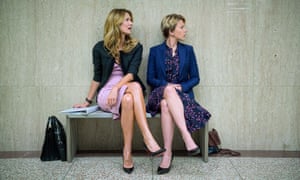 |
| Adam Driver and Scarlett Johansson |
Marriage Story review – everything you always wanted to know about divorce
Adam Driver and Scarlett Johansson are terrific as a couple facing the awful aftermath of their relationship in Noah Baumbach’s heartfelt drama
A
ll marriages are a mystery to outsiders, they say, and even more so to the married people themselves. In 2013, writer-director Noah Baumbach got divorced from screen star Jennifer Jason Leigh, and, until Leigh presents us with her own fictionalised movie version of their breakup (and who knows if she hasn’t considered it, or is considering it), we won’t have anything approaching the complete creative picture. Until then, here is Baumbach’s superb Marriage Story, a glorious laugh-out-loud, cry-out-loud portrait of a relationship in its death throes.
This wonderfully sweet, sad and funny film simply delivers more moment-by-moment pleasure than anything else around. It would be reductive to call it autobiographical, but it is notable how scrupulously generous his movie is to the soon-to-be-ex-wife figure, played impeccably by Scarlett Johansson. It is adroitly balanced and emotionally calibrated, although there are incidental details about who is the first to lawyer up, and a 55/45% split in the child custody arrangement. I wonder what Leigh makes of these points.
Adam Driver and Johansson play Charlie and Nicole. He is a brilliant director in the world of off-Broadway theatre, now becoming the toast of the town; she is his wife and star player – a one-time LA movie actor who moved to New York to be with her husband and lent crucial glamour to his fledgling stage company in the beginning. But (to her chagrin) she is becoming far less important to a husband who, despite his devastating and quite unaffected intelligence and charm, is indifferent to her needs and opinions. They have an eight-year-old son, Henry (Azhy Robertson). The offer of high-profile TV work in Los Angeles brings Nicole’s discontent to an awful crisis, even more painful because Charlie has a genuine, affectionate closeness to Nicole’s mother, Sandra – a wonderful performance by Julie Hagerty – and sister Cassie (Merritt Wever). These women are besotted with Charlie, and who can blame them?
Their relationship unravels, as does the couple’s undiscussed assumption that things can be settled amicably and informally. Without realising the arms race she’s starting, Nicole naively hires tough LA attorney Nora, played by Laura Dern in deliciously predatory mode, always kicking her heels off to snuggle up to her tearful client on the office couch. The baffled and bemused Charlie has no choice but to find a crazily expensive representative of his own, and must choose between attack dog Jay, played by Ray Liotta (and what a thrill to hear his syrupy-gravelly voice again) and gentle, avuncular Bert, hilariously played by Alan Alda – always including meandering anecdotes and interminable funny stories in his billable hours. (“Am I paying for this joke?” asks Charlie at one point, desperately.)
It is only a few microseconds into the film when you realise who it’s indebted to, whose DNA it’s built around. A funny movie about divorce, about movies, TV, theatre? About the contest between New York and LA? With elegant, souffle-light montages showing men moving into sad apartments or shopping with their kid? And ageing showbiz-veteran parents hosting soirees with people singing? When I saw this first, I scribbled down a quote from Play It Again Sam: “My lawyer will call your lawyer”; “I don’t have a lawyer – have him call my doctor.” It could be that the disputed status of Woody Allen may create a crisis of critical sayability about Marriage Story and its antecedents, and other movies besides, a problem concerning the implied approval of a mention. (When Claire Denis’ futurist sci-fi movie High Life included a “Fuckbox” in space, it was notable how many critics thought it expedient not to mention the Orgasmatron.)
Well, the Allen influence is overwhelming, though this film’s high points are equal to anything in Allen: there is a moving montage right at the top showing what Charlie and Nicole love and value in each other (what a torrent of thinking that is going to cause with couples going to see this as a date movie) followed by an excruciating, agonising scene showing how Charlie can’t stop controlling his wife: insisting on giving her notes after the last night of their play, when it no longer makes any difference. And there is an extraordinary, semi-stylised scene when depressed Charlie breaks into song (Stephen Sondheim’s Being Alive) in a theatre piano bar. It’s a realist karaoke situation, but it morphs for a dreamlike moment into being an actual musical.
Opinions may divide about Charlie and Nicole’s central rage-filled confrontation, and this does feel theatrical, but in such a lucid and intelligent way. Johansson has never been smarter or more charismatic than in this film, and Driver’s great Easter Island statue face was never more alluring. Run, don’t walk, to any cinema showing this.





No comments:
Post a Comment